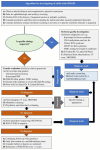Comprehensive evaluation of the child with global developmental delays or intellectual disability
- PMID: 38810986
- PMCID: PMC11374451
- DOI: 10.3345/cep.2023.01697
Comprehensive evaluation of the child with global developmental delays or intellectual disability
Abstract
Global developmental delay (GDD) and intellectual disability (ID) are relatively common neurodevelopmental disorders that significantly impact affected children, their families, and society. The etiology of GDD/ID is notably diverse, encompassing both genetic and acquired factors. Although the precise cause of most GDD/ID cases remains unclear, an estimated half of all cases can be attributed to genetic factors. Thus, a detailed medical history and comprehensive physical examination remain pivotal for guiding diagnostic investigations into the underlying causes of GDD/ID. Advancements in genetic testing have supplanted traditional methods such as karyotyping and fluorescence in situ hybridization with chromosomal micro arrays, which are now the primary genetic tests for children with idiopathic GDD/ID. Moreover, the evaluation of Fragile X and Rett syndrome should be an integral component of initial diagnostic assessments. In recent years, whole-exome sequencing and whole-genome sequ-encing have emerged as important diagnostic tools for evaluating children with GDD/ID and have substantially enhanced the diagnostic yield rates. Gene therapy has emerged as a promising avenue and is poised to become a cornerstone in addressing various genetic developmental and epilepsy disorders. Early intervention facilitated by a proficient multidisciplinary team can markedly enhance the prognosis and outcomes of GDD/ID, particularly when parents or caregivers are actively engaged in the interventional process. This review discusses risk factors and common underlying causes, explores recent evidence and recommendations for genetic evaluation, and offers management strategies for children with GDD/ID.
Keywords: Child; Genetic testing; Global developmental delay; Intellectual dis-ability; Next-generation sequencing.
Conflict of interest statement
No potential conflict of interest relevant to this article was reported.
Similar articles
-
Evaluation of Individuals with Non-Syndromic Global Developmental Delay and Intellectual Disability.Children (Basel). 2023 Feb 21;10(3):414. doi: 10.3390/children10030414. Children (Basel). 2023. PMID: 36979972 Free PMC article. Review.
-
Genetic determinants of global developmental delay and intellectual disability in Ukrainian children.J Neurodev Disord. 2024 Mar 27;16(1):13. doi: 10.1186/s11689-024-09528-x. J Neurodev Disord. 2024. PMID: 38539105 Free PMC article.
-
The second-tier status of fragile X syndrome testing for unexplained intellectual disability/global developmental delay in the era of next-generation sequencing.Front Pediatr. 2022 Jul 22;10:911805. doi: 10.3389/fped.2022.911805. eCollection 2022. Front Pediatr. 2022. PMID: 35935362 Free PMC article.
-
Diagnostic approach with genetic tests for global developmental delay and/or intellectual disability: Single tertiary center experience.Ann Hum Genet. 2019 May;83(3):115-123. doi: 10.1111/ahg.12294. Epub 2018 Nov 6. Ann Hum Genet. 2019. PMID: 30402882
-
Updates in the genetic evaluation of the child with global developmental delay or intellectual disability.Semin Pediatr Neurol. 2012 Dec;19(4):173-80. doi: 10.1016/j.spen.2012.09.004. Semin Pediatr Neurol. 2012. PMID: 23245550 Review.
References
-
- Diagnostic and Statistical Manual of Mental Disorders (DSM5) [Internet]. Washington, DC; American Psychiatric Association Publishing; [2024 Fe 17]. Available from: - DOI
-
- Khan I, Leventhal BL. Developmental delay. In: StatPearls [Internet]. Treasure Island (FL): StatPearls Publishing; 2024 Jan- [updated 2023 Jul 17]. Available from: https://www.ncbi.nlm.nih.gov/books/NBK562231/
-
- Masri AT, Oweis L, Ali M, Hamamy H. Global developmental delay and intellectual disability in the era of genomics: diagnosis and challenges in resource-limited areas. Clin Neurol Neurosurg. 2023;230:107799. - PubMed
-
- Sachdeva P, Sitaraman S, Minocha P, Jain RS, Choudhary A, Jetha K. Etiological profile of children with global developmental delay: a single center study. J Pediatr Neurol. 2018;17:111–7.
LinkOut - more resources
Full Text Sources


